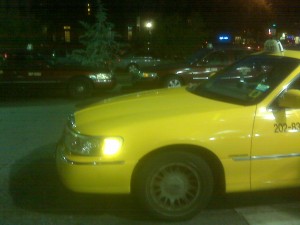 Listen to The Taxi Link on WUST 1120 AM
Listen to The Taxi Link on WUST 1120 AM
Audio clip: Adobe Flash Player (version 9 or above) is required to play this audio clip. Download the latest version here. You also need to have JavaScript enabled in your browser.
In their push to overhaul D.C.’s taxicab industry, District officials are ignoring the pleas of drivers, and the law.
According to the D.C. Code, the nine-member Taxicab Commission must have three industry representatives. But only Commissioner Stanley Tapscott is from the taxicab industry; and even he was prevented from voting on the sweeping changes approved last week requiring taxis older than seven years to be taken off the road.
There’s a good chance the Commission will soon be brought into compliance with the law thanks to legislation introduced by Ward 3 Councilmember Mary Cheh, chair of the Committee on the Environment Public Works and Transportation, which oversees the taxicab industry.
But instead of requiring the Commission to comply with existing law, Cheh, who’s a constitutional scholar, is attempting to amend the law such that it legitimizes the Commission’s practice of excluding taxi industry members.
The 1985 Taxicab Establishment Act defines “industry member” as someone who “shall have experience in taxicab operations in the District.” Cheh’s bill seeks to expand that definition to include those “experienced in the transportation or hospitality industry.”
If approved by the full Council, Cheh’s bill would help codify the hospitality and transportation industries’ already outsized influence over the fate of the District’s 8,000 drivers, who are among the city’s working poor.
The law notwithstanding, until this past week when Tapscott was seated, the Commission had been without an industry representative for several years.
Ron Linton, chairman of the Taxicab Commission, opposes drivers serving on the Commission, and he’s even gone so far as to say their presence amounts to “a dictatorship.”
But if D.C.’s taxi policy is dictated by any group it’s the powerful hospitality industry.
Of the seven commissioners presently serving, three are from the hospitality industry: Paul Cohn, a restaurateur and owner of Georgia Brown’s (the Commission claims Cohn is an industry member); Bart Lasner of Loews Hotels; and Destination DC president and CEO Elliott Ferguson (whose 2010 nomination as an industry member was tabled as the result of driver protests, and he was recently appointed as a public member).
Meanwhile the transportation industry is represented on the Commission by Ralph Burns, who works for the District Department of Transportation. Until last year, Burns was joined on the Commission by fellow DDOT employee Scott Kubly, who, until he left for Chicago, was known to all but run Commission meetings at times.
In testimony before the D.C. Council, Laurence Benenson, an attorney with Akin Gump, took the District to task for its interpretation of industry member. “District officials have maintained that an industry member may be any person connected to any industry with a tangential connection to taxicabs… They have contended that the hotel and restaurant industries are connected to the taxicab industry because hotels and restaurants use taxicabs to serve their own customers.”
“Under this logic,” Benenson continued, “an industry representative could come from a limitless number of industries. The airline and passenger rail industries would qualify because their customers use taxicabs to and from airports and train stations. Law firms and government agencies would qualify because their employees regularly take taxicabs to and from work. Doctors’ offices and grocery stores would qualify as common taxi destinations for individuals without automobiles. Steel mills, which provide steel for automobiles, and car dealerships, which sell vehicles to industry participants, may even qualify.”
In addition to legitimizing the hospitality and transportation industries’ outsized influence over taxicab drivers, Cheh’s bill would create the possibility for passengers, as well as drivers, to be tracked.
The bill mandates that drivers install a credit card reader with a GPS tracking device, thus allowing for the potential tracking of passengers by coordinating their credit card payments with their taxis’ whereabouts at the time of the transaction.
The credit card readers, which are to be provided by a soul sourced contractor, will be installed at no cost to drivers. But according to D.C. Chief Financial Officer Natwar Gandhi, the city doesn’t have the funds to foot the bill for the installation.
Cheh, however, says her bill will raise more than enough revenue to cover the cost through a surcharge of up to $0.50 per ride, which she anticipates will raise $10 million a year. Under Cheh’s plan, this money would be captured by the Taxicab Commission and used, in part, to install the credit card readers.
Cheh’s credit card readers, which will have screens and be placed in the back of the cab, will generate further revenue for the Taxicab Commission from playing advertisements, a feature which has proven highly unpopular in New York. While drivers will have to endure the endless ads, they won’t receive a share of the revenue.
In the rush to push through an overhaul, Cheh and Linton, both relative newcomers to the taxi industry, are attempting to greatly increase the authority and budget of the Taxicab Commission despite the troubled agency’s well documented problems and illegitimacy.
Related Stories:
D.C. Taxi Fares Just Got Significantly Higher… Or Maybe Not, April 25, 2012
Taxi Chair and Media Make Serious Allegations Against Drivers, But Offer No Evidence, April 5, 2012
